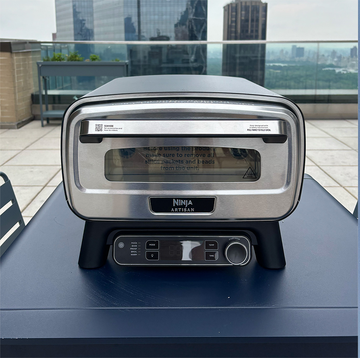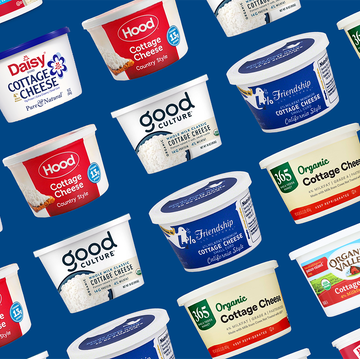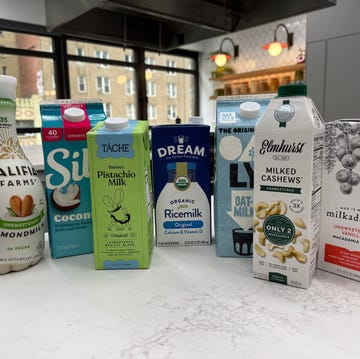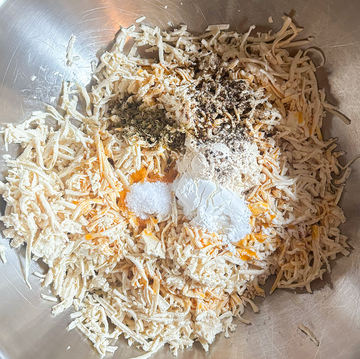Hi, my name is Tess, and I eat food and talk about it on camera for a living. And while a lot of the time I have to dig to find the purpose in a role like that (have you ever had to mumble with conviction through a bite of the world's largest turkey leg?), what I always land on is this: Food connects us. People crave it, they want to know more about it, and they want to talk about their hopes, dreams, and plans while eating it. That's why my videos—and those of the many other entertainers who make similar content—work; they allow for an escape that is both productive and satisfying.
The mukbangers of YouTube could've told you this years ago, of course. The art of mukbang, which originated online and on TV in South Korea around 2010, consists of someone sitting in front of a camera, eating, and interacting with those on the other end; in fact, "mukbang" literally translates to "eating broadcast." The purpose of the videos in an isolating digital age is to narrate your way through a meal in order to make the audience feel like they're experiencing it with you—nothing of the sort had existed before Korean YouTubers put it out into the ether.
The original videos were so delightful and cathartic, they spawned a genre of internet eating that continues to fill voids in people's lives to this day. Want to watch someone work their way through your favorite restaurant's menu so you know what to get next time? That exists! Feeling like listening to someone sexy-slurp her way through some seafood? Great, you'll be able to find it! Craving the closeness that is sharing a meal with a loved one while the entire world is closed during a global pandemic? Oh yeah, that works, too.
In fact, the coronavirus outbreak has pushed this genre of already hugely popular content creators to get even more creative with their videos. While they shelter in place, their subscribers are hungry for connection, a few of them tell me. The demand for more videos where they eat and talk and eat and talk has become, at times, overwhelming. Even people who deliver videos in entirely different realms have turned to mukbanging and food challenges to patch the hole in their fans' hearts. And from it? They've seen increased subscriber-ship, average view times, and engagement. And while society slowly begins to re-open, eating a meal inside a restaurant with a friend is still far from our reality. These creators want to keep people entertained (safely, of course, but also now, with a philanthropic spin) until whenever that reality does hit.
The link between the COVID-19 pandemic and an increased demand for more mukbang is not coincidental, Kim Thai, whose mukbang channel "EAT WITH KIM" has 433,000 subscribers, explains: "I definitely see that my viewers want to see more of me [since March]." In fact, the requests have been so frequent, she feels confident "they wouldn't mind if I uploaded multiples videos in one day...I would love to do that but there's only so much I can do in 24 hours." Pre-COVID, she stuck to a one-video-per-day schedule but has been taking some time to take care of herself (and her other YouTube channels) despite the influx because she wants to maintain the quality of her content.
ErikTheElectric, whose 1.8 million subscribers know him for both mukbang and food challenge videos, noticed the spike in interest from his fans around the same time: "I attribute that to the fact that they're indoors, and in some countries, people can't even go outside, so they are finding that vicarious interaction or satisfaction through watching YouTubers eat food."
And, sure, yeah—being stuck inside certainly points to increased screen time and content consumption from, like, all of us, but it doesn't explain why the videos featuring people eating and talking to the camera have become more popular than the other videos the same people put out. Kim has a channel focused on fashion, beauty, and lifestyle that has 100,000+ more followers, but it has significantly lower viewership on all videos produced during the pandemic than her mukbangs do. Same thing with Erik's recent videos that aren't strictly food challenges.
But it makes sense from a psychological standpoint, Dr. Luke Ayers, a psychologist at Widener University, unpacks: "[Food] is a nice mild drug—really! And when you're stressed out [Ed. note: like, say, in times of an actual goddamn plague], self-control is impaired a bit." You become motivated to seek food out, especially when you're stressed and don't have immediate access to it. And food is, in the most basic of human ways, an outlet that satisfies just about everyone, which is why makeup tutorials may be falling a bit flat for you right now, but watching 10 pounds of seafood go down someone's throat over the course of 15 minutes at 1 a.m. feels so, so right.
Jackie Iadonisi, a self-described "on-camera" individual who hosts for Clevver, a YouTube channel with 3+ million subscribers and several off-shoots with millions more, has more of a personal interest in food than a professional one. While creating solely for her 22,000 Instagram followers at home, she polled them to see what they'd like to watch from her whilst quarantined. The overwhelming requests for mukbang, something she'd never done on either a work or personal feed, came as a shock. At first. "I decided to shoot [a mukbang at home] and surprisingly, it did really, really…well, better than my other videos I normally post," she shared. The feedback from her foray into mukbang was overwhelmingly positive, even though "[I'm not this food expert—I do like food and I like to try food, but the comments were 'do more, try more.'" And while Jackie felt awkward and vulnerable doing so at first, she "will do it again," because the engagement was so strong.
"What's drawing people to mukbang right now," Erik explains, "is that it's like having a conversation with somebody you don't see face-to-face. They're not your typical YouTube videos where you sit down and absorb whatever you want to absorb but you don't think about it after—you interact with that person who's on the screen." For him, that interaction manifests in doing food challenges from local, struggling restaurants or encouraging people to use the COVID-safe method of curbside pick-up. Kim has kept "the same vibe and the same energy" throughout all her quarantine videos, but she "[likes] to be very honest with [her] subscribers so they usually always can tell anything that is bothering me." Jackie notes that anything she produces from here on out—whether it's mukbang, which, probably—will, in some way, benefit a small food-related business.
This new world we're living in is something all three YouTubers have and will continue to acknowledge while they film at home. They're very aware you're looking to them for an escape at this particularly stressful juncture, but they don't want to reap the benefits or your attention without nodding to what brought you here in the first place. Of note: Both Erik and Jackie mentioned their videos are being watched all the way through for longer than pre-pandemic times, and Kim explains "all creators on YouTube are facing lower revenue [last month and this month] so far because of COVID-19. Advertisers aren't spending as much money on marketing, so even though we are racking in a lot of views because everyone is home watching YouTube, creators' monthly incomes are lower than usual."
As for me, Delish's resident quasi-mukbanger? I have pivoted to attempting to bring people joy at home via theme park recipes I proceed to shovel into my face with an attempt at self-awareness and humor. See you on the other side of a vaccine, I guess, when we all have burgeoning YouTube channels and a nearly rabid appreciation for sharing meals with friends.













